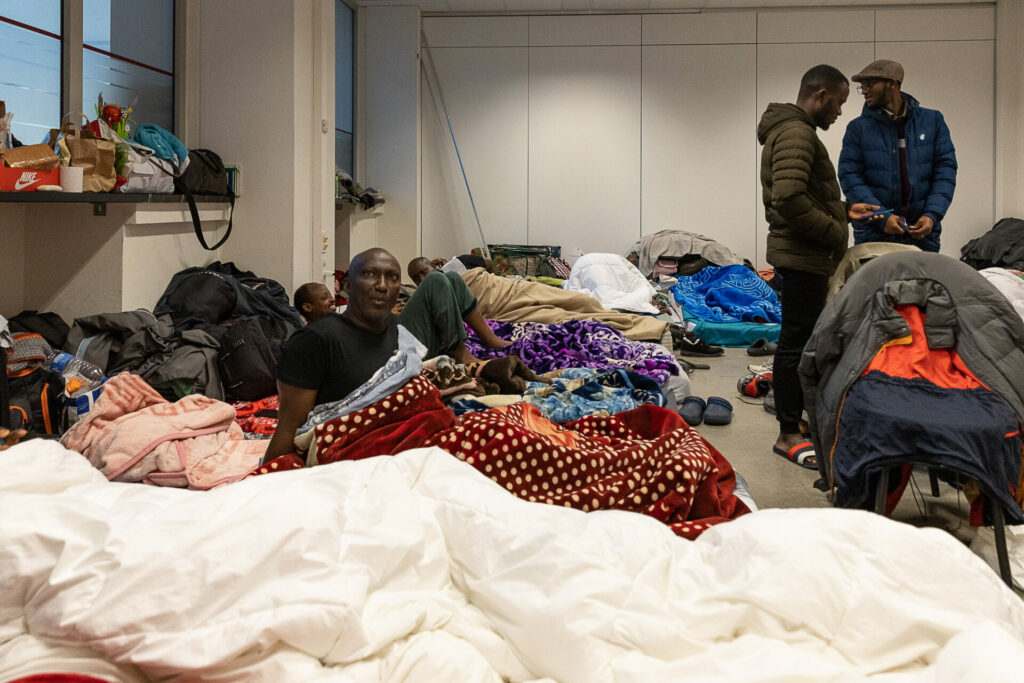The screening of all people occupying the abandoned Palais 48 building in Schaerbeek has been finalised, with results showing 735 of the 784 people who were registered by the various services on the ground were asylum seekers.
In recent days, a Fedasil mobile team has been registering the people seeking refuge in the derelict building to identify asylum seekers and transfer them to designated reception centres. According to Belgian law, they are legally entitled to shelter, however in practice, Fedasil has failed to provide this to thousands of asylum seekers.
The number of people housed in the derelict building has grown significantly since the end of last year, while the situation has deteriorated severely, with a fire breaking out on the third floor, an unprecedented medical inspection revealing worrying health situations, and two people dying as a result of an overdose and stabbing.
Schaerbeek mayor Cécile Jodogne repeatedly rang the alarm bells regarding the deteriorating situation in the building and the inhumane living conditions and called for the screening.
She has now confirmed that the "overwhelming majority" of occupants are Annex 26 holders, entitling them to accommodation, contrary to what Secretary of State for Migration and Asylum, Nicole de Moor, has been claiming for months. De Moor's cabinet noted that 180 of those who came forward during the screening were not from the squat.
Next steps?
The finalisation of the screening should lead to de Moor sitting at the table with Jodogne and Brussels Minister Alain Maron to discuss what should happen to any people who might still be staying there. Jodogne once again called for a rapid and concrete reaction from all members of the federal government to "resolve this catastrophic and inhumane situation."
Fedasil is working to remove people with a right to shelter — 175 asylum seekers from the squat have already been allocated a place — but Thomas Willekens from Vluchtelingenwerk Vlaanderen told The Brussels Times that the human tragedy is likely to continue.
Families with children and unaccompanied minors are given priority for shelter. Credit: Hatim Kaghat / Belga.
"In January, there are still some 3,000 people on the waiting list for a sheltered place. These are being processed at a rate of nine people per working day. At the current rate, it will take 1.5 years for everyone to be given shelter. To put it simply, it is all too slow: too little, too late," he told The Brussels Times.
De Moor's cabinet told The Brussels Times that the process is done step-by-step as enough places have to be reserved for "families and children seeking asylum who arrive in our country every day. They are the most vulnerable and we, therefore, receive them as a priority." Last year, these groups were also left sleeping rough.
Not waiting another three months
Jodogne, meanwhile, deplored the fact that de Moor is "only now realising, with this census, the extent of the disaster. We are not going to wait another three months for solutions to be found."
She added that the Federal Government must "prove by its actions that it is not failing. For asylum seekers, for the citizens who see this situation worsen and for the municipalities which, like Schaerbeek, are once again in the front line."
Related News
- Despite 6,000 convictions, Belgium still refuses to tackle reception crisis
- Man climbs on roof squatted building in Brussels Rue de Palais
Meanwhile, those living in the building who did not register will not be given help. Willekens stressed that all people who find themselves in precarious situations need to be helped, regardless of their status.
"Now, we do not know where they will go and there is a good chance that they will settle somewhere else or on the streets, and the human dramas will continue," Willekens concluded.

